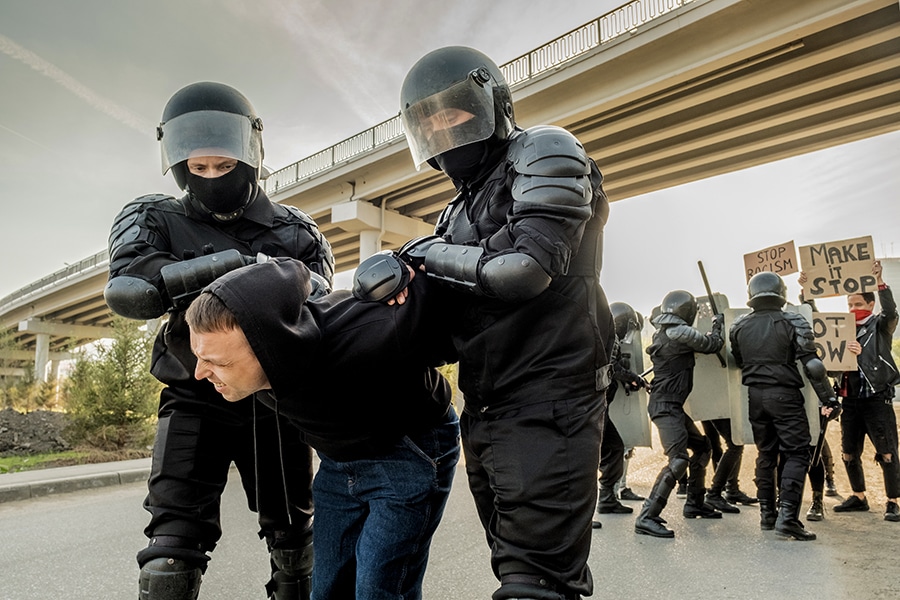You’ve probably heard the term excessive force before, in the news, at the office, and on social media. It’s become an important point of discussion surrounding police brutality, but what qualifies as excessive force?
In this article, we’ll dive into what excessive force is and what civil rights protections guard you against excessive force.
Use of Force Spectrum
The use of force spectrum outlines five categories of force used by law enforcement. Each category is progressively more intense. Law enforcement should escalate their use of force only when the severity and danger of a situation escalate.
Officer Presence: The first category of force is the presence of law enforcement within an area. No actual force is used, but the presence of police is used to defuse a situation.
Verbalization: Police officers voice commands to get suspects to comply. This category may include non-threatening verbal requests or hand gestures.
Empty-Handed Control: Law enforcement use physical force in this category. Officers restrain, hold, punch, or kick but do not use weapons.
Less Lethal Control: Police use non-lethal weapons to subdue a subject. Weapons can include rubber bullets, police dogs, pepper spray, and more.
Lethal Force: Police officers use any lethal weapon, usually firearms.
How Much Force Are Police Allowed to Use?
Police are expected to use the minimum amount of force necessary to subdue a suspect. Any additional amount is considered excessive.
The most apparent use of excessive force is any force used against a subject already subdued and incapable of resisting arrest.
Types of Excessive Force
There are two types of excessive force: lethal and nonlethal.
Non-Lethal force includes the use of handcuffs and zip-ties, tasers and chemical sprays, crowd control weapons, batons, and neck restraints. A myriad of weapons can fall into these categories. Crowd control can include the use of rubber bullets and tear gas.
Although nonlethal force weapons are intended not to fatally harm suspects, death and serious injuries have occurred. This is often a result of police misuse and overuse of these weapons.
Excessive lethal force usually includes the use of guns. Around 95% of fatal force cases involve police shootings.
When Can Police Use Deadly Force?
Police are allowed to use lethal force under two circumstances. The first of which is if a suspect poses an imminent threat of serious or deadly harm to police or civilians.
Law enforcement officers can also use lethal force if a suspect of a serious crime is attempting to flee from police. This mostly pertains to suspects of felonies where serious bodily harm was committed.
While this is the Federal threshold for deadly force, more restrictive guidelines may be instituted by state governments.
Grounds For Liability
If a police officer used more force than allowed by federal and state laws, there may be grounds for liability. The officer in question could face criminal charges for assault, or, in cases of deadly force, manslaughter or murder.
The most significant roadblock for police liability is qualified immunity. Individuals do have the right to sue government officials when their rights have been violated. However, the qualified immunity doctrine protects officers against personal liability unless a Constitution violation can be clearly established.
Court cases against law enforcement in excessive force cases have often used the qualified immunity doctrine to prevent police liability.
Protecting Your Civil Rights from Excessive Force
The first step in protecting yourself against excessive force is to know your civil rights.
Police use of excessive force is considered a Constitutional violation of the Fourth Amendment, which prohibits unreasonable search and seizure, and cruel and unusual punishment.
There are other statutes and civil rights laws that protect individuals from excessive force. Section 242 of Federal Law creates additional protections against excessive force when color, race, or alien status is a contributing factor.
The Police Misconduct Provision protects all citizens from law enforcement officers with a pattern of poor conduct. Additional rights laws and statutes also protect individuals in excessive force, police brutality, and police misconduct cases.
Have questions about excessive force? Call us at (800) 874-3528 to learn more.
